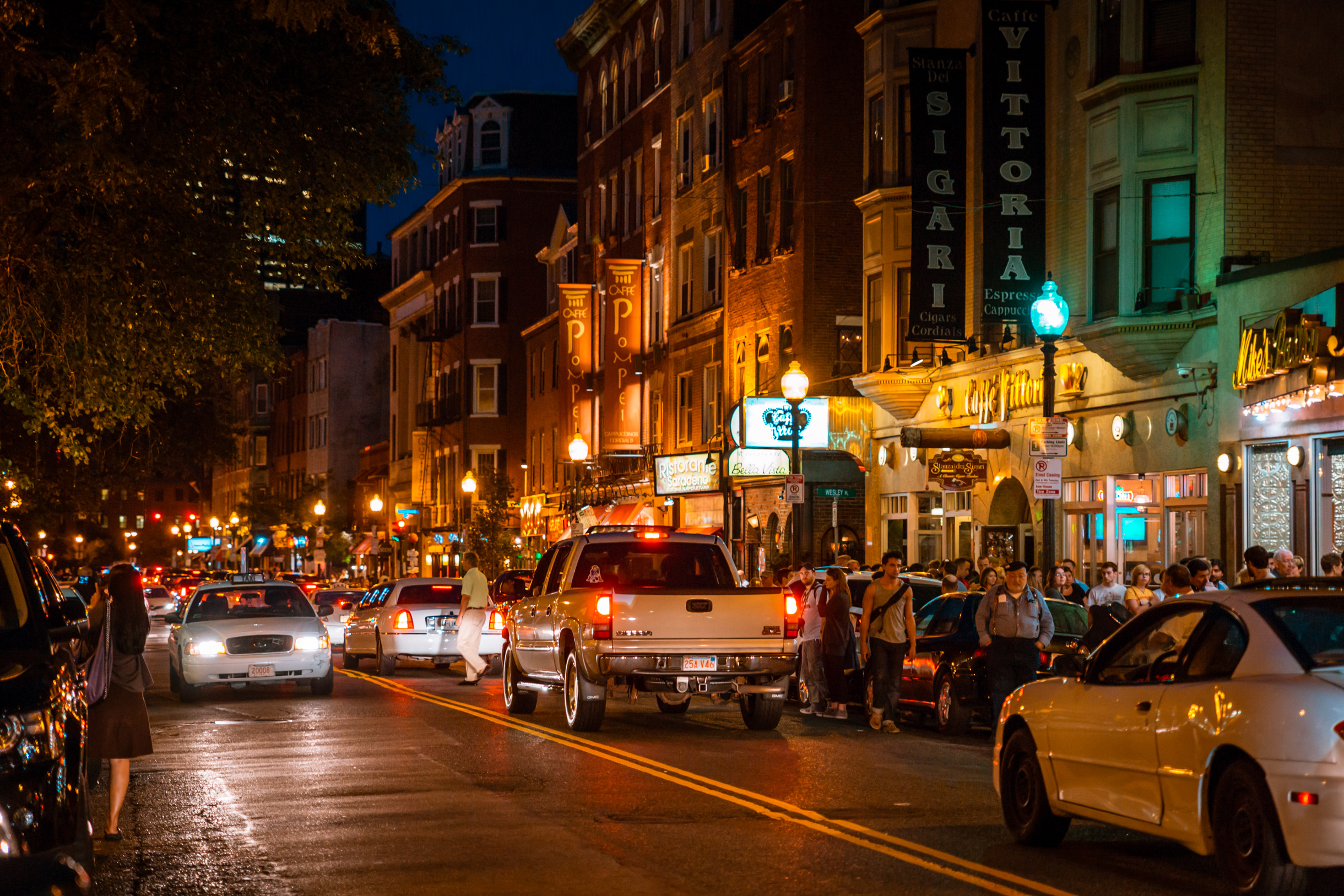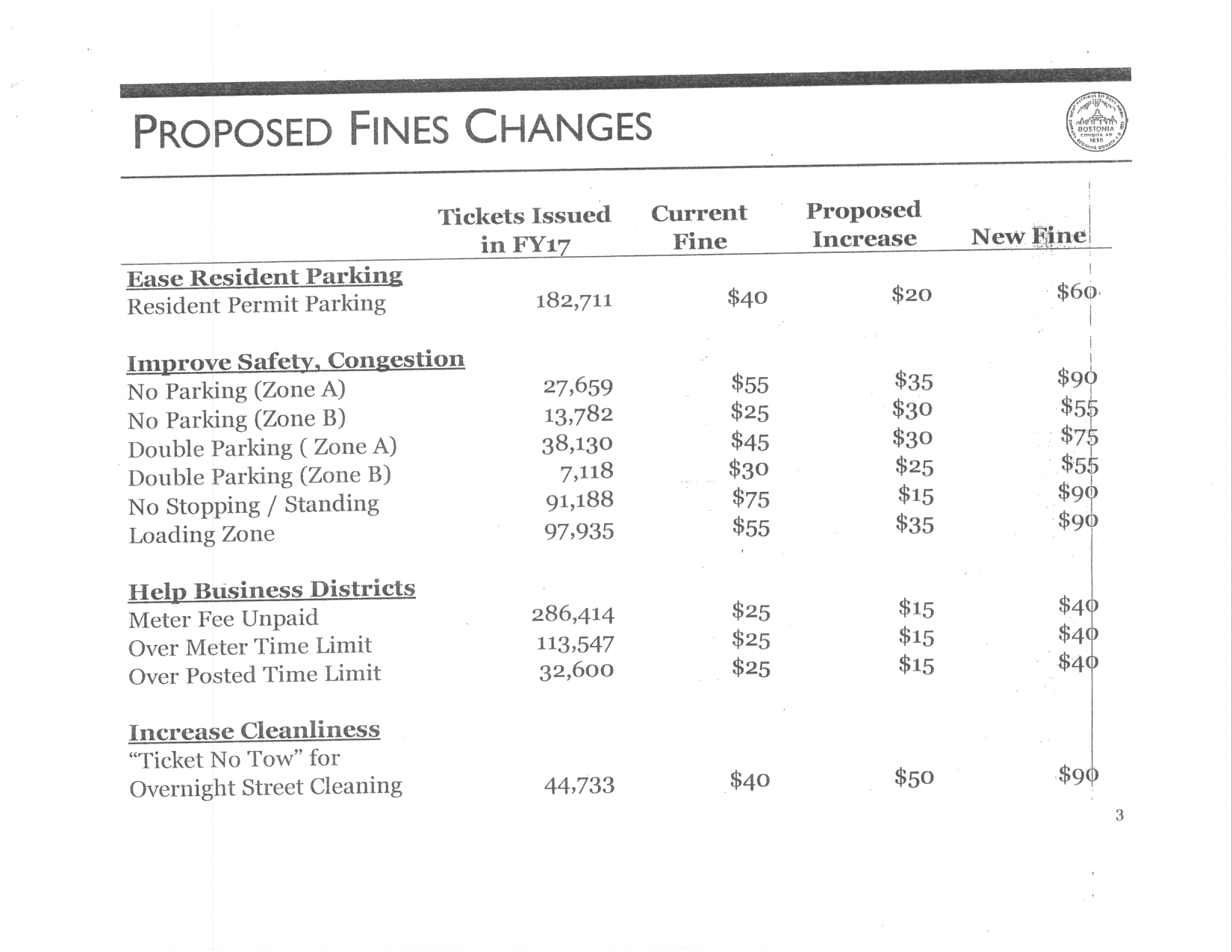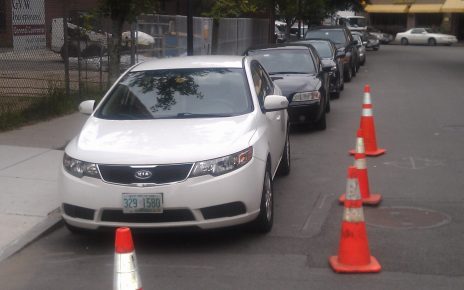
Mayor Walsh has proposed a $5 million annual increase in Boston transportation spending, including protected bike lanes and pedestrian paths, intersection redesigns, and traffic signal advancements.
This proposal will be largely funded through a set of parking fine increases, with some doubling or more. This includes higher fees charged for a non-resident parking in a residential spot, parking in “No Parking” / “No Standing” zones, double parking, and unpaid and expired meters. See the full list of proposed fines changes below. The increase in revenue from these new fines will be put back into the City’s streets, per the Mayor’s plan, to fund some of the 58 projects and policies in Go Boston 2030.
The increase in revenue from these new fines will be put back into the City’s streets, per the Mayor’s plan, to fund some of the 58 projects and policies in Go Boston 2030.
“Increasing various parking fines that have not been adjusted since 2008 and allocating those funds to improve the City’s ability to better manage its transportation services is smart public policy that will lead to more reliable commutes for the City’s residents and those who work in Boston.” – Sam Tyler, President of the Boston Municipal Research Bureau
Key projects to be funded include:
Strengthening Bus Transit
Boston’s new “Transit Team” will work with the MBTA to improve public transport with a focus on buses. They will identify key bus corridors and implement strategies such as transit signal priority and dedicated bus lanes to improve the bus riding experience. This would include North Washington Street in the North End area, where the #4 bus operates.
“Today’s investment by Mayor Walsh shows Boston is serious about planning for the future and achieving a safe, efficient, sustainable transportation network that is less dependent on cars. The creation of the ‘Transit Team’ strengthens the City’s relationship with the MBTA as a partner in improving the bus network to transform the commutes of many communities dependent on transit,” – TransitMatters President Marc Ebuña
Investing in Streets & Signals
There will be a $2 million increase in investment for roadway resurfacing and sidewalk repairs and $150,000 for stormwater interventions on city roadways. A new traffic signal engineer will work to retime traffic lights to increase safety and reduce traffic congestion.
Increased Safety for Walking & Biking
An additional $750,000 will be invested in the Walkable Streets program to increase pedestrian safety and $400,000 for the Green Links program to fill missing bike and pedestrian connections to parks and paths. The annual investment for high-quality bike infrastructure will increase $300,000 to a total of $1.2 million.
“With this investment in safety, operations and multi-modal thinking about our streets, sidewalks and trail systems, Boston is re-taking its place among the leading American cities on walking, biking and transit. Thank you to Mayor Walsh and the Boston Transportation Department for finding creative ways to fund impressive new investments.” – WalkBoston Executive Director Wendy Landman
There will also be two new planners and two new engineers to focus on improving challenging intersections, and up to four new maintenance & operations personnel to ensure infrastructure added to improve street safety is kept in good repair. The changes were met with a positive response from Becca Wolfson, Executive Director of the Boston Cyclists Union:
“With this funding, Boston’s streets will become safer for people walking, biking, taking transit, and driving. As we work to make Boston the number one major city for biking in the country, we’ll continue to hold the city accountable and push for the amount of infrastructure funding needed to make transformative progress on our streets.”
Easing Congestion & Parking
In addition to the updated fines, the City will add a new parking enforcement senior supervisor so the Parking Enforcement team can respond to complaints 24/7.
Coordinating Across Private Stakeholders
A new program manager will develop policies and programs focused on Transportation Network Companies, electric vehicles & autonomous vehicles. A new transportation planner will work to have privately-funded street improvements directly benefit the surrounding neighborhood.
The announcement received support from Boston’s Transportation Leaders. City Councilor Michelle Wu also supported the investment saying:
“I’m thrilled that this year’s budget will include major investments to improve transportation access across the city. The increased funding and staff capacity will support implementation of key improvements within city control — protected bike lanes, better bus transit, walkable streets, new traffic signal technology and safer intersections. Not only does everyone benefit when we make transportation safer, more affordable and more reliable; the continued growth of our city and the economic mobility of our residents depend on it.”
The increase in parking fines on Boston drivers was met with criticism, including this editorial in the Boston Herald:
“The reality is that sometimes there are no spaces left. If a mother has to pick her child up from a day care on Commercial Street in the North End at 5 p.m. and there are no spaces around, she will need to park illegally, temporarily, and risk getting whacked with a $90 ticket. With day care easily costing $15,000 a year in Massachusetts, that kind of penalty from the city is just inhumane.”
Mayor Walsh will include the parking and transportation plans in his fiscal 2019 budget to be submitted this week to the City Council for approval.




I think the City is on the right track by increasing parking ticket fines for non-residents – whether or not they actually enforce the parking violations is a different story…
However, similar to the street cleaning fine increase of $50, I would like to see the non-resident fine increased by $50. This would greatly deter any non-residents from taking up spots on nights where there are events at the Garden. Increasing the fine from $40 to $60 is a good start, but I think increasing the fine to $90 would really make out-of-towners think twice before taking up a resident spot.
Couldn’t agree more! Perhaps they could also restructure when meter maids work because there is a lack of enforcement on nights and weekends when it is MOST needed.
This makes a lot of sense. The violation of resident parking areas is the second most issued ticket. If the goal is to raise money, wouldn’t it make sense to increase the cost of each violation? It eould yield more revenue.
ticketing non-resident parkers still doesn’t get me or anyone other resident a parking space. these cars need to be towed.
As a former north end resident, when I come down to the feast on a Friday night or attend anything in the north end or go to the Garden, I pay and park my car at the brinks or take a Uber, it’s well worth the price than circling around looking for a spot, or even taking the T in weather permitting.
Jo,if I may ask what does it cost to park at the Brinks if a person is just coming into the neighborhood for several hours?
25 dollars You can park for up to 6 hours during the day
Thank you Jo.😁
sometimes the parking lot next to the funeral Parlor has deals depending on a funeral or not,, sometimes you come in with 4 people split the parking it’s well worth it ,, not 5o rush worry if your cars going to get ticketed,, I’ve even come in parked at Malden center,,oak grove for 5 bucks and taken the t in for concerts,, it’s boston it’s a city, believe me I don’t expect nothing for nothing
Boston has been manage by democrats for decades, it is becoming one of the most expensive cities in the country. The mayor and the policies of the democratic party have contributed to the congestion and pollution the congestions causes with projects that don’t deliver, for example the bicycle lanes that are chocking traffic by narrowing street size and reducing lanes. Now the move is to further erode access by increasing fines to promote more of the same programs that are not contributing to the quality of life in the city.
I don’t understand what the plan is, the Democrats, the party of the people are turning Boston in a city hostile to middle class families and workers, all the policies supported by the mayor promote high end development for the very rich and increase taxes and penalties for those trying to leave in a city that has forgotten about their working-class residents.
Tax breaks for giant corporations like GE in loe of employment, funny over $160,000,000 in tax breaks for maybe 800 jobs no wonder the city is broke.
You’ll get a kick out of this story. If Boston knew what they were up against, they wouldn’t have had to try that hard.
A recent conversation with a retired friend who was an engineer and manager for GE in Connecticut. The governor of Connecticut tried to convince GE not to leave. He arranged for a presentation to GE’s management and had his staff prepare a Powerpoint packet. On the front cover there was a picture of a jet engine. The aghast GE folk had to point out to the governor that the jet engine was a Pratt & Whitney engine. The whole rest of the. presentation never progressed to page two.
Kudos to the mayor for focusing on increased pedestrian safety and improving bicycle infrastructure. The protected lanes on Commercial are terrific. I ride nearly every day, and having safe space to circulate makes every day better. I’ve been hit once and doored a couple times, so I really appreciate a more level playing field for bikes vs. cars.